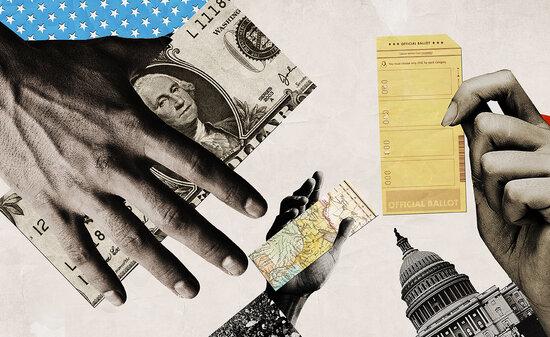This topic examines the influence of money on political campaigns and decision-making, including the effects of campaign finance laws, the role of special interest groups, and the rise of political action committees (PACs).
Money has always played a significant role in politics, influencing the outcome of elections and shaping policy decisions.
In modern politics, the role of money has become even more pronounced, as political campaigns have become increasingly expensive and special interest groups have gained more influence.

This essay explores the role of money in politics, including the effects of campaign finance laws, the role of special interest groups, and the rise of political action committees (PACs).
One of the main ways that money influences politics is through campaign contributions. Political campaigns are expensive, and candidates rely on contributions from individuals, corporations, and other organizations to fund their campaigns.
However, the influence of money on campaigns has raised concerns about the potential for corruption and the distortion of the democratic process.
Campaign finance laws have been enacted in many countries to regulate the role of money in politics. These laws typically limit the amount of money that individuals and organizations can contribute to political campaigns, and they require disclosure of campaign contributions and spending.
In the United States, for example, the Federal Election Campaign Act (FECA) regulates the role of money in federal elections. Setting limits on contributions and requiring disclosure of campaign finance information.
While campaign finance laws can help to limit the influence of money in politics. They have not been entirely effective in addressing the issue. One of the reasons for this is the rise of political action committees (PACs). Which have become increasingly influential in political campaigns.
PACs are organizations that are formed to support political candidates or issues. They can be formed by individuals, corporations, labor unions, or other organizations, and they are subject to campaign finance laws.
PACs can contribute to campaigns directly and run independent campaigns supporting or opposing candidates.
The rise of PACs has had a significant impact on the role of money in politics. PACs significantly impact political campaigns by contributing millions to candidates also running independent expenditure campaigns that sway election outcomes.
This raises concerns about undue influence and distortion by special interest groups in democracy.
Special interest groups are another way that money can influence politics. Special interest groups represent specific groups like businesses, unions, environmentalists, or religious organizations.
These groups can use their resources to lobby politicians and influence policy decisions.
Special interest groups can be influential in shaping policy decisions, especially when they have significant financial resources. For instance, a business group might lobby for tax breaks or policies favoring its members.
Similarly, an environmental group might use its resources to lobby for regulations that protect the environment.
Special interest groups’ influence on politics raises concerns about undue influence also democratic process distortion.
Critics argue special interest groups can sway politicians with financial resources, distorting policy decisions for their benefit, not the public’s
Conclusion
Money’s role in politics raises concerns about democratic process integrity.
Campaign finance laws aim to regulate money’s role in politics. However, the emergence of PACs and special interest groups complicates efforts to tackle the issue.
While money can be a legitimate way to support political campaigns and influence policy decisions. Ensure democracy remains free from undue influence, ensuring policy decisions serve the public interest. 카지노사이트
